| Srl | Item |
| 1 |
ID:
135540
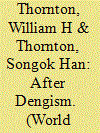

|
|
|
|
|
| Summary/Abstract |
The seeming departure of president Xi Jinping from Deng Xiaoping’s “pragmatic” moderation owes much to a highly tendentious misrepresentation of Deng’s core objectives. For 35 years, Dengism has been viewed through a globalist lens that flatly contrasts it with Maoist authoritarianism. From a post globalist vantage however, it appears that Deng’s reforms reconfigured rather than ended statist oppression. dengism was born out of the recognition that capitalism and authoritarianism were fully compatible and together were crucial for the survival of the CCP. “Opening China” China was Deng’s ironic mechanism for safeguarding against claims, which mandate a liberal corrective that Xi fears more than any other international contest. What he and other CCP elites dread most is a liberal post-globalisation that could foment a grassroots “China Spring”.
|
|
|
|
|
|
|
|
|
|
|
|
|
|
|
|
| 2 |
ID:
135542
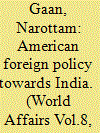

|
|
|
|
|
| Summary/Abstract |
This article contracts the American/Western judeo-Christian culture and its definition of the world with the traditional Asian/Eastern Indic perspective to explain major features of US policy towards developing countries in general and India in particular. American diplomacy so far has been dictated by the national belief in the superiority of biblical monotheism and US outreach is associated with the spread of judeo-christinity and the defeat of “paganism”. In the name of protecting religious freedom, the American government claims the right to monitor the status of religion in other countries and support Christian missionary organizations. This policy is also a tool to keep India and other countries in a subordinate role by expanding US influence in all field.
|
|
|
|
|
|
|
|
|
|
|
|
|
|
|
|
| 3 |
ID:
135541
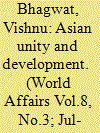

|
|
|
|
|
| Summary/Abstract |
The winding down of colonial empires in the middle of the twentieth century was greeted by a wave of revolutionary and reformist idealism in the newly liberated countries of the third world. many international agencies and movements rose to address the inequalities and injustices inherited from the old system but a reaction from the dominant former imperial powers managed to block or reverse that evolution and establish a subtler neo-colonial exploitative regime through the mechanism of globalization enforced by the petrodollar reserve currency, major banks and multinational corporations. Today various international associations such as ALBA, ASEAN, and BRICS are developing alternatives to the hegemonic Euro-American order.
|
|
|
|
|
|
|
|
|
|
|
|
|
|
|
|
| 4 |
ID:
135560
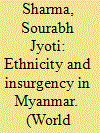

|
|
|
|
|
| Summary/Abstract |
Since independence from British rule, the Union of Myanmar (Burma) has been undermined by several secessionist movements, pitting ethno-religious minorities against the dominant Barmar population. as such, the country exemplifies the fragility and fissiparousness of most nation-states in Asia, exposed to internal subversion often fostered by outside forces. this article analyses the main regional insurgent actors and the present government’s plan to end conflict by conceding wide autonomy to minority areas within a genuine federal structure as intended by the Panglong Agreement of 1947.
|
|
|
|
|
|
|
|
|
|
|
|
|
|
|
|
| 5 |
ID:
135538


|
|
|
|
|
| Summary/Abstract |
Discussions related to global show a growing agreement about the kernel of global problem being a complex mix of cultural and psychological factors such as thought processes, value and worldviews. This consensus is supported by historical experience, which provides numerous examples of crises caused by activity. a survey of such percents helps highlight the essence of the trouble humanity is currently experiencing. The themes in this paper have developed alongside evolutionary mechanisms recently conceptualized as a result of two complementary paradigms- mega-history and complexity (synergetic or chaos theory). The article also briefly present key patterns and mechanisms to substantiate final arguments.
|
|
|
|
|
|
|
|
|
|
|
|
|
|
|
|
| 6 |
ID:
135559
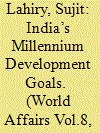

|
|
|
|
|
| Summary/Abstract |
The millennium development goals (MDGs) are a by-product of the United Nations Millennium Summit to institute certain time-bound goals by 2015. Eight goals were set forth and six core values identified as being essential to understanding international relations in the twenty-first century. As the countdown to 2015 is about to end, this paper looks at the extent to which the goals have been achieved in India regarding the issues of poverty, hunger and development. It also delineates whether they have led to the establishment of a more equitable, humane and just order. It is hoped that the MDGs do not remain mere wishes but are realized so that various forms of deprivation, marginalization and socioeconomic inequalities and inequities may be addressed, leading to the formation of a socially inclusive society in India. The article uses quantitative data and indices drawn from various UNDP reports.
|
|
|
|
|
|
|
|
|
|
|
|
|
|
|
|
| 7 |
ID:
135539


|
|
|
|
|
| Summary/Abstract |
This article present a scientific and practical concept for a new type of multisectorial project, integrated in its internal structure and cooperative in the external form of its implementation. The plan is to build a transnational development corridor across Eurasia-from the Atlantic to the pacific- harnessing cutting-edge technologies for industrial research and production, transportation and communication, financed by a new basket of fiat currencies and sovereign debt instruments. it aims to pull the global economy out of the current crisis while shaping an innovative civilisational module for the future.
|
|
|
|
|
|
|
|
|
|
|
|
|
|
|
|
| 8 |
ID:
135549
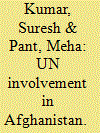

|
|
|
|
|
| Summary/Abstract |
Throughout history Afghanistan has been beset by warlordism, internal strife and also subjected to foreign invasions. In the nineteenth and early twentieth centuries, it was at the centre of the “Great Game” played between the Russian Empire and British India. In the late twentieth century the last Afghan war, which involved the mujahedeen with support from Pakistan, the US and other powers on one side and the Afghanistan communist government and the Soviet Union on the other, ended with letter’s withdrawal in 1989. In the mujahedeen and Taliban, the people of Afghanistan hoped for a future of peace and prosperity, rather than the hostility that was to come. In the aftermath of the 11 September 2001 attacks in the US, international forces invaded the country. Although the Taliban were toppled within a month, much was left to rebuild and reconstruct. This paper delineates the reconstructions process in Afghanistan and the role of the United Nations as institutions which have time and again been appointed as a guardian of peace and development in the world.
|
|
|
|
|
|
|
|
|
|
|
|
|
|
|
|